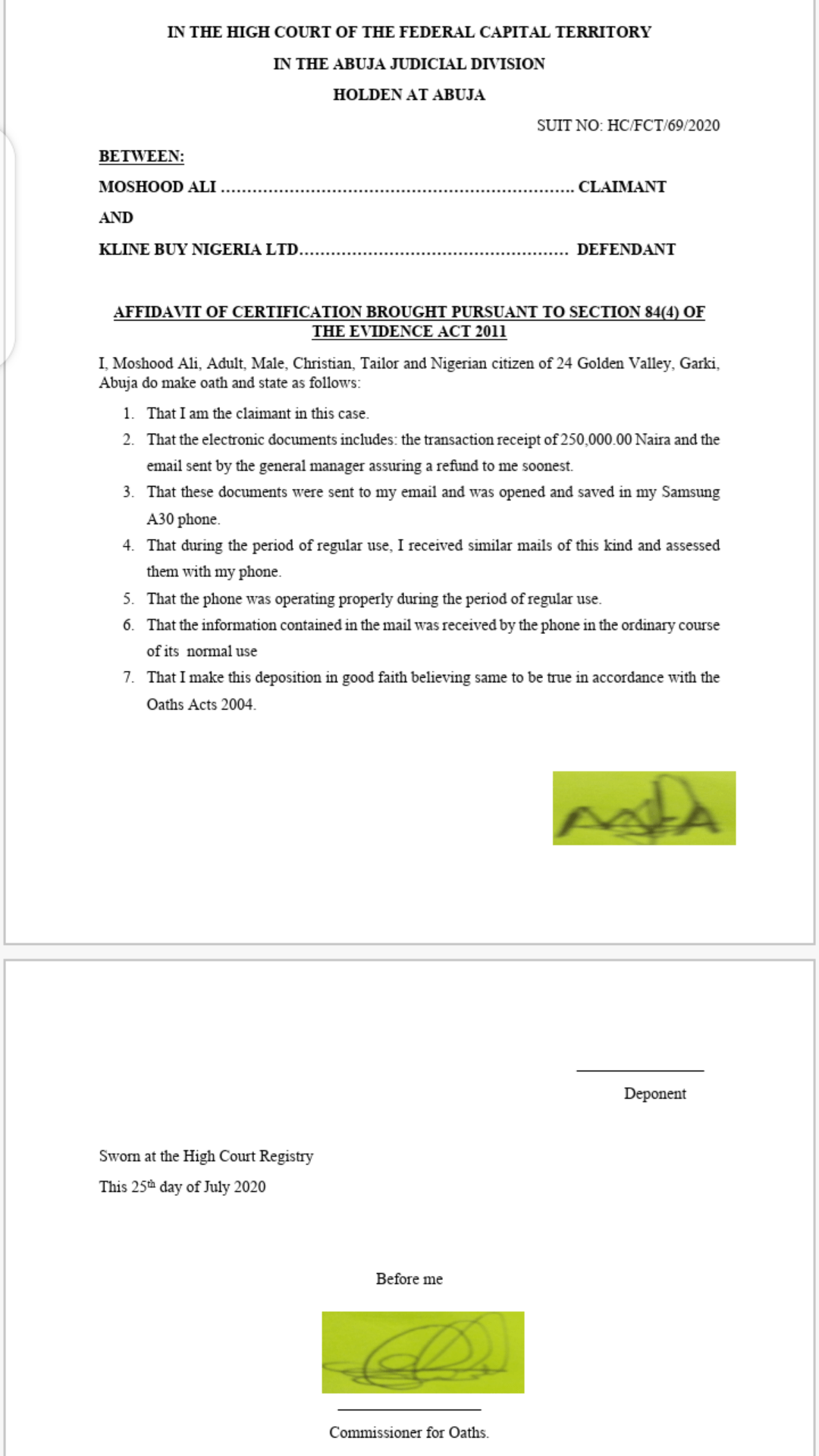In this article, we will be taking a comprehensive look at the meaning and contents of a good affidavit. In addition to that, I will share with you a sample and guide on how to write an affidavit perfectly.
An affidavit is a written statement of an individual sworn to be true, and is usually used in a court or negotiation. It therefore flows that an affidavit is a very important document in both judicial and extra judicial processes, that is to say within and outside the court. Hence the need for everyone to know how to write an affidavit. This article buttresses on how you can write a perfect affidavit.
Before I delve into how you can write a perfect affidavit, it is important we expatiate on the meaning of an affidavit.
RECOMMENDED: How to answer law essay and problem questions using IRAC Method
What is an Affidavit?
An affidavit is a written statement of evidence sworn to be true by the person making it called a deponent, before a person authorized to take the affidavit (commissioner of oaths) and where admissible is receivable in legal proceedings as evidence either in support of an application or in answer to reply.
Furthermore, an affidavit is said to be a voluntary statement of facts written down and sworn to by the declarant before an officer authorized to administer oaths.
According Section 109 of the Evidence Act of Nigeria, such affidavit may be sworn under oath before any judge, officer, or other person duly authorized to take affidavits in Nigeria.

Must Read: Salary structure of lawyers in the United States (US)

Importance of an Affidavit
1. An affidavit is important to establish the truthfulness of a statement. For instance, where you are a witness in a case, your affidavit helps in establishing the truth of a claim whether or not you are in court. Also, when you want to change your name, you need to write an affidavit stating your previous name, and it is presumed that those facts contained in your affidavit of change of name are true.
2. In addition, an affidavit is very important in proving that some legal instruments such as title to a land, gift of property, et cetera are valid.
3. The importance of an affidavit is underlying in the fact it is required to be used in a lot of circumstances. These circumstances are as follows:
4.An affidavit otherwise known as affidavit of service is used to verify that the recipient has been given the relevant documents.
5. To make or verify a name change, most especially if you are newly married or divorced
6. To verify identity. The affidavit of identity is used to verify who you claim to be, and it is often used by banks or other financial institutions to certify your identity.
7. To purchase a land or real estate. The affidavit used for this purpose is an Affidavit of Title which is used to prove that the seller owns the property and isn’t currently undergoing bankruptcy, and this affidavit also protects the buyer by attesting that they are the sale recipients of the property, and no other person.
8. To verify your residence, usually known as affidavit of residence.
9. To notify someone such as spouse during post-dissolution proceedings of a change in circumstances.
10. To prove your relationship to a deceased.
11. To make a formal statement as a witness in the court.
12. It’s used in distributing property to beneficiaries of wills and testament.
13. It is used to claim assets.
14. It is used to notify a creditor or a third party of the death of someone.
Below is a short but wonderful video that explains what an affidavit is and why you need any affidavit. Trust me, you will enjoy watching.
Contents of an Affidavit
1. Court Heading: In the case of Nigeria, Section 117(1) of the Evidence act 2011 states that: Every affidavit taken in a cause or matter shall (a) be headed in the court and in the cause of the matter.
This section is to the effect that since an affidavit is a sworn testimony of facts deposed by a person especially in support of a matter or cause before the court, such affidavit must be headed in the appropriate court which the affidavit is sought to be filed. The heading must include the name of the Court, it’s jurisdiction and judicial division.
An example of a court heading is:
“IN THE HIGH COURT OF ABIA STATE
IN THE ABIA JUDICIAL DIVISION
HOLDEN AT ABIA”
2. Suit number: A suit number is the number allotted to the case before the court. Hence, it is a requirement in an affidavit which is used for a judicial proceeding. The suit number is usually written on the right corner of an affidavit just below the court heading.
2. Names of parties: The inclusion of the names of parties is specifically for affidavits used in a judicial proceeding. The names of parties are not required in other forms of affidavit.
3. Title: The title is the subject matter of the affidavit. For example, Affidavit in support of a motion on notice, Affidavit in support of an application, Affidavit of identity, et cetera.
4. Introductory statement: An affidavit always begins with an introductory statement which must state the following: Name of the deponent, gender, citizenship, occupation, and address.
Section 117(1)(b) of the Evidence Act of Nigeria provides that: Every affidavit taken in cause or matter shall state the full name, trade or profession, residence, and nationality of the deponent. This is also the case in some other common law courts like the United States, India, Bangladesh, Ghana, South Africa etc.
An example of an introductory statement is: “I, Anayo Tochukwu, Male, Nigerian citizen, Lawyer of No 41 NBB estate do make oath and state as follows:”
5. Statement of fact: This is a chronological statement of facts which are relevant to a case, application or the facts in issue. This statement of facts must include only facts which the deponent is conversant with, and the deponent must state these facts without argument. Section 115(1) of the Evidence Act states that: Every affidavit used by the court shall contain only a statement of facts and circumstances to which the witness deposes, either of his own knowledge or from information which he believes to be true.
6. Signature of the deponent: Also, in Nigeria, the Evidence Act provides that “An affidavit when sworn shall be signed by the deponent or if he cannot write or is blind, marked by him personally with his marks in the presence of the person before whom it is taken.”
This section therefore makes it mandatory for the deponent of an affidavit to affix his signature, failure to do so renders the affidavit useless and worthless in the eyes of law.
7. Registry: The registry where the affidavit is sworn is usually written at the bottom left corner of the affidavit, just below the signature. The registry is like:
“SWORN TO AT THE HIGH COURT REGISTRY, ABIA”
After the mark of the registry where the affidavit was sworn, the Date of the affidavit, the stamp and signature of the commissioner of oaths or other required notary follows.
Below is a PNG sample of an affidavit:

Also see: How to become a successful lawyer: 7 qualities you need
How To Write An Affidavit?
In order to write a perfect affidavit, you should comply with the aforementioned sample and contents of an affidavit. In addition, you must take note of the following rules:
1. An affidavit must state only facts, and shouldn’t include any argument or conclusion.
2. An affidavit must be signed.
3. An affidavit must be notarised, that is to say that a notary must administer an affirmation or oath to you before the document is signed.
4. You must avoid grammatical and spelling errors in your affidavit. So therefore, you need to proofread your affidavit.
RECOMMENDED: Major differences between active income and active income
In conclusion, it is instructive to note that there are various types and forms of an affidavit. The sample affidavit is an example of an affidavit of Certification used in a judicial proceeding. So therefore, when you need an affidavit for an extra-judicial proceeding such as identity, title, change of name, et cetera, you must check out for the format of such affidavit. While the format of an affidavit may differ from another, the aforementioned rules in writing an affidavit remains constant.

Edeh Samuel Chukwuemeka, ACMC, is a lawyer and a certified mediator/conciliator in Nigeria. He is also a developer with knowledge in various programming languages. Samuel is determined to leverage his skills in technology, SEO, and legal practice to revolutionize the legal profession worldwide by creating web and mobile applications that simplify legal research. Sam is also passionate about educating and providing valuable information to people.